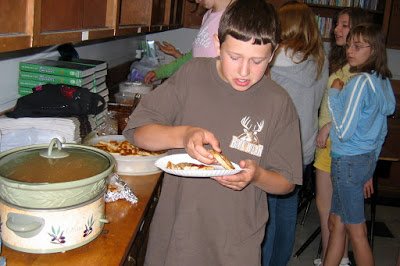In my own little way I feel a lot like I suppose President Obama felt during his first 100 days, except that in lieu of doing so in press conferences I’m going to say “I’m swamped” right here and now: Even though our new house with its pretentious pillars that serve merely their own egos is high on a hill, everything feels a little boggy right now.
I don’t mean the rain, although M counted six consecutive gray days and it seems to have rained for the past 36 (or is it 48?) hours. The unpacked boxes on our front porch, there under the second story porch roof supported by those blasted pillars, are quite wet, including the ones I finally stuffed into the back of the pickup (where they won’t become any more dry because my bed cap leaks) as a token preparation for when I begin reading Hamlet with my students tomorrow.
Now that the state exams are upon us—this week, in fact, which means I should be quaking in my (soaked) boots and sneaking Pop Tarts from the student-designated stash—I’m pulling away from the last six weeks of review and starting some bigger projects, fun ones that I hope will be meaningful. The boxes for Hamlet will remain in their soggily distressed form; I’m hoping that my classes’ set crews will pile them or use them otherwise nondestructively to make Elsinore and grave stones and the like, right there in the classroom.
Which is wholly mine again, at least for a few days, as my student teacher is taking the testing week off to regroup before returning for two days next week. She’s a great student—a career switcher—and she even subbed for me for three days one week when I used all of my personal leave time to work on the house.
One day as she and I sat in our respective classroom corners munching our lunches, a particularly fiery student burst in, her clarinet reed perched on her lips, the storm cloud usually hovering above her head apparently mildly dissipated. She marched around the room straightening student desks.
“I’m excessive compulsive,” she told us. “These desks are all crooked.”
Even if my students’ test results aren’t too negatively skewed, I’m going to have my own excessively crooked details to be compulsive about. This house is full of the projects for which I for years have yearned to have and through which I now must wade patiently, calmly, and happily.
But let me back up to jog your memory. First, here’s what the dining and living rooms looked like when we finally got access to the place:
Next, here’s what they looked like on one of those days or late nights during the week when my brother-in-law actually put in more time than I did in a mad dash so that we could move in without that pesky wire- and plumbing-ridden, supporting wall between the two rooms:
Now the big room looks like this:

Remember that suffocating hallway wall upstairs?

It’s been replaced:

Our ever-morphing lists of things to do has nearly come to life itself, since we moved in last Saturday, but as we’ve tried to breathe deeply and enjoy the moments here in our new home, other things already living have quickly made themselves evident.
The second night I scurried into our bedroom only to see a gray blur dash into the hallway, then into the bathroom, and behind the toilet.
I poked around there until it scrambled back into the bedroom, behind our bed, and into a wall opening that was still awaiting more wiring attention. I walked to N’s bedroom where M was putting her down for the night.
“Guess what I just chased,” I said.
“You’re not serious.”
“At least it was cute.”
I headed for the basement where I’d seen a discarded trap which I generously loaded with peanut butter and set there by the bedroom wall hole, just two feet from the pillow on which my beautiful head would attempt to rest.
In the morning, the peanut butter was gone, the trap unsprung. I’d set it too securely.
That afternoon I bought some new traps and when N was again safe in her crib for the night, I launched my second campaign. I turned off the bedside lamp and waited.
Soon I could hear rustling. I grabbed my flashlight and shone it on the doomed creature as it ventured forth from the wall. I quickly turned off the light, and the noises continued. When I again shone the light for but a second, the mouse was licking the peanut butter.
“It’s licking the peanut butter,” I whispered to M as we both made tense, pitiful whimpering sounds.
The snap! came soon enough, and I threw the poor dead mouse into the cow pasture and, carefully avoiding any cross contamination, I again put peanut butter onto a knife and then used—just once—a toothpick to transfer the bait to the trap.
This time I dozed off, but within the hour was harshly jerked awake by a second mouse being snapped; it soon joined its companion in the pasture. Once again I used toothpicks to set the trap—but thankfully, no more signs of mice have surfaced since.
That harrowing night, however, persuaded M to agree with me that a kitten would make a perfect pet for N—which means I need to add to my to-do list one more thing: build a little cat house so our new pet won’t get cold and wet when it rains.

 …cabbage and white bean soup in a crock pot brought in by the mother of the boy who the previous week had objected to my censorship of certain parts in Mel Gibson’s
…cabbage and white bean soup in a crock pot brought in by the mother of the boy who the previous week had objected to my censorship of certain parts in Mel Gibson’s  …corn fritters, accompanied by two jugs of the student’s special iced tea for the class;
…corn fritters, accompanied by two jugs of the student’s special iced tea for the class;




